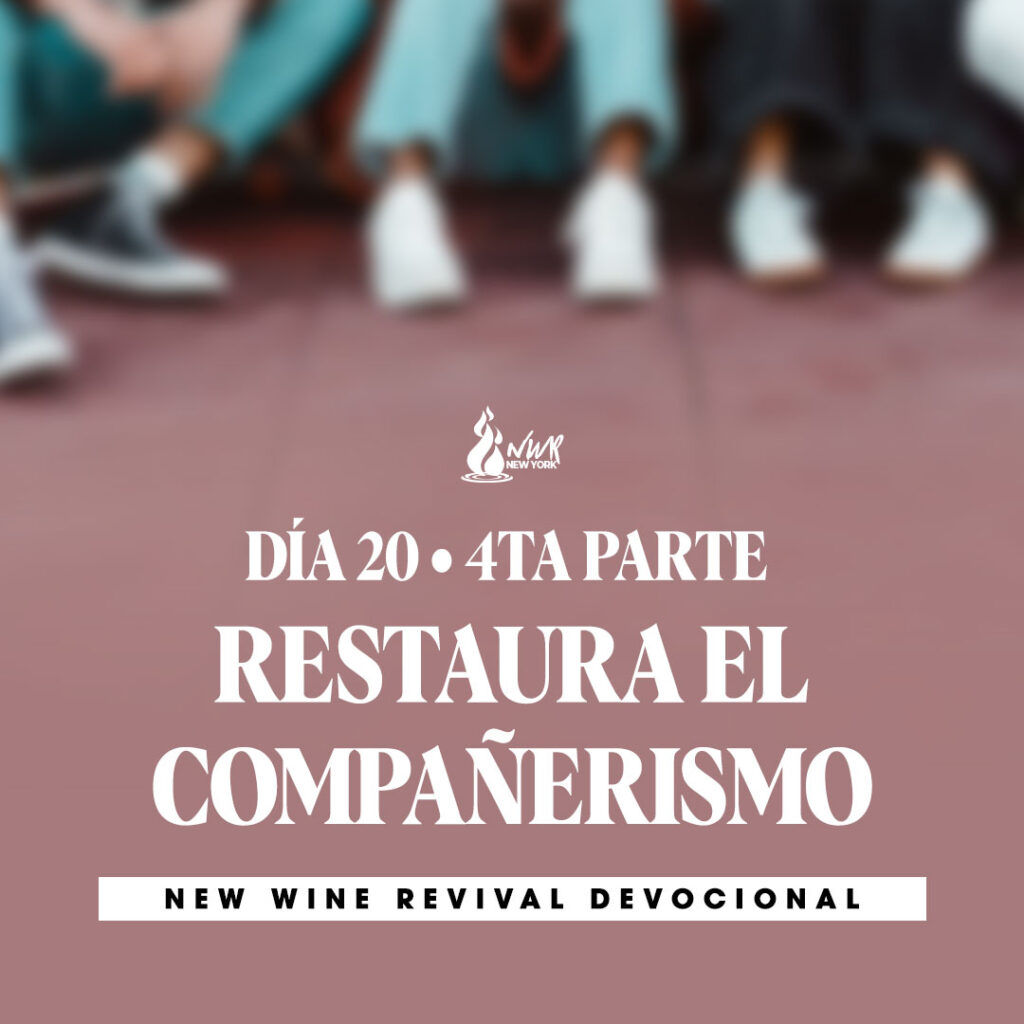
La respuesta amable calma el enojo, pero la agresiva echa leña al fuego. PROVERBIOS 15:1 (NVI)
La Biblia dice: «El buen juicio hace al hombre paciente; su gloria es pasar por alto la ofensa».La sabiduría produce paciencia y se adquiere escuchando otras perspectivas. Cuando escuchamos, le decimos a la persona: «Valoro tu opinión, me interesa nuestra relación y me importas tú». Esto es cierto: Me importa saber lo que sabe un amigo porque me importa mi amigo.
A fin de restaurar el compañerismo debemos «agradar al prójimo para su bien, con el fin de edificarlo». Aguantar con paciencia el enojo de los demás es un sacrificio, sobre todo si no tiene fundamento. Pero recuerda, eso fue lo que Jesús hizo por ti. Soportó el enojo malicioso e infundado para salvarte: «Porque ni siquiera Cristo se agradó a sí mismo sino que, como está escrito: “Sobre mí han recaído los insultos de tus detractores”».
Confiesa tu parte en el conflicto. Si realmente te interesa restaurar una relación, debes comenzar admitiendo tus propios errores o pecados. Jesús dijo que debes sacar primero «la viga de tu propio ojo, y entonces verás con claridad para sacar la astilla del ojo de tu hermano».
Como todos tenemos un punto ciego, puede ser necesario pedirle ayuda a un tercero para que te ayude a evaluar tus propias acciones antes de reunirte con la persona con quien tienes un conflicto. Pídele a Dios que te muestre tu parte de culpa en el problema. Pregúntale: «¿Soy yo el problema? ¿Soy poco realista, insensible o demasiado sensible?». La Biblia dice que «si decimos que estamos libres de pecado, lo único que conseguimos es engañarnos».
La confesión es una herramienta muy poderosa para la reconciliación. A veces la manera en que tratamos un conflicto produce un daño mayor que el problema original. Cuando comenzamos por reconocer con humildad nuestras equivocaciones, el enojo de la otra persona se apaga y la desarmas, porque posiblemente esperaba que estuvieras a la defensiva. No te excuses ni culpes al otro; reconoce con sinceridad la parte que te corresponde en el conflicto. Asume la responsabilidad que te corresponde por tus errores y pide perdón.
Ataca al problema, no a la persona. No es posible arreglar el problema si lo que te interesa es encontrar quién tuvo la culpa. Debes optar por una cosa u otra. La Biblia dice: «La respuesta amable calma el enojo, pero la agresiva echa leña al fuego». Si estás enojado nunca lograrás persuadir a la otra persona, así que elige tus palabras con mucho cuidado. Una respuesta amable es siempre mejor que el sarcasmo.
Al resolver conflictos, la manera en que se dicen las cosas es tan importante como lo que se dice. Si eres agresivo, tus palabras se recibirán a la defensiva. Dios nos dice: «A la persona sabia y madura se le conoce por su inteligencia. Cuanto más agradables sus palabras, más convincente es la persona». Ser fastidioso nunca sirve. No podemos ser convincentes cuando somos ásperos.
Durante la Guerra Fría, ambas partes acordaron que algunas armas de guerra eran tan destructivas que nunca deberían usarse. En la actualidad, las armas químicas y biológicas están prohibidas, y los arsenales de armas nucleares se reducen y se destruyen. Para salvar el compañerismo, es necesario destruir nuestro arsenal de armas nucleares relacionales: la desaprobación, el menosprecio, las comparaciones, las etiquetas, los insultos, la condescendencia y el sarcasmo. Pablo lo resume de la siguiente manera: «Eviten las palabras dañinas, usen solo palabras constructivas, que sirvan para edificación y sostén, de modo que lo que digan haga bien a quienes escuchan».
Reflexión:
Al resolver conflictos, la manera en que se dicen las cosas es tan importante como lo que se dice.
DAY 20/Fourth part • Restoring Broken Fellowship
A gentle response defuses anger, but a sharp tongue kindles a temper-fire. PROVERBS 15:1 (MSG)
The Bible says, “A man’s wisdom gives him patience; it is to his glory to overlook an offense.” Patience comes from wisdom, and wisdom comes from hearing the perspective of others. Listening says, “I value your opinion, I care about our relationship, and you matter to me.” The cliché is true: People don’t care what we know until they know we care.
To restore fellowship “we must bear the ‘burden’ of being considerate of the doubts and fears of others. . . . Let’s please the other fellow, not ourselves, and do what is for his good.”
It Is a sacrifice to patiently absorb the anger of others, especially if it’s unfounded. But remember, this is what Jesus did for you. He endured unfounded, malicious anger in order to save you: “Christ did not indulge his own feelings . . . as scripture says: The insults of those who insult you fall on me.”
Confess your part of the conflict. If you are serious about restoring a relationship, you should begin with admitting your own mistakes or sin. Jesus said it’s the way to see things more clearly: “First get rid of the log from your own eye; then perhaps you will see well enough to deal with the speck in your friend’s eye.”
Since we all have blind spots, you may need to ask a third party to help you evaluate your own actions before meeting with the person with whom you have a conflict. Also ask God to show you how much of the problem is your fault. Ask, “Am I the problem? Am I being unrealistic, insensitive, or too sensitive?” The Bible says, “If we claim that we’re free of sin, we’re only fooling ourselves.”
Confession is a powerful tool for reconciliation. Often the way we handle a conflict creates a bigger hurt than the original problem itself. When you begin by humbly admitting your mistakes, it defuses the other person’s anger and disarms their attack because they were probably expecting you to be defensive. Don’t make excuses or shift the blame; just honestly own up to any part you have played in the conflict. Accept responsibility for your mistakes and ask for forgiveness.
Attack the problem, not the person. You cannot fix the problem if you’re consumed with fixing the blame. You must choose between the two. The Bible says, “A gentle response defuses anger, but a sharp tongue kindles a temper-fire.” You will never get your point across by being cross, so choose your words wisely. A soft answer is always better than a sarcastic one.
In resolving conflict, how you say it is as important as what you say. If you say it offensively, it will be received defensively. God tells us, “A wise, mature person is known for his understanding. The more pleasant his words, the more persuasive he is.” Nagging never works. You are never persuasive when you’re abrasive.
During the Cold War, both sides agreed that some weapons were so destructive they should never be used. Today chemical and biological weapons are banned, and the stockpiles of nuclear weapons are being reduced and destroyed. For the sake of fellowship, you must destroy your arsenal of relational nuclear weapons, including condemning, belittling, comparing, labeling, insulting, condescending, and being sarcastic. Paul sums it up this way: “Do not use harmful words, but only helpful words, the kind that build up and provide what is needed, so that what you say will do good to those who hear you.”
Reflection:
In resolving conflict, how you say it is as important as what you say.



